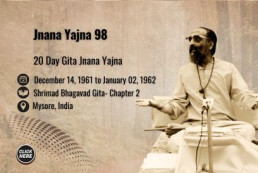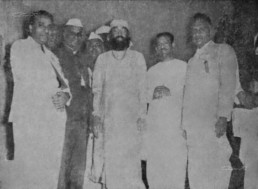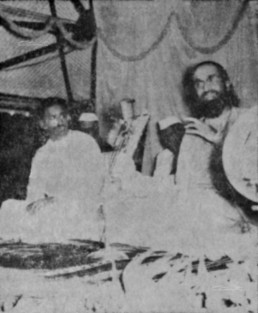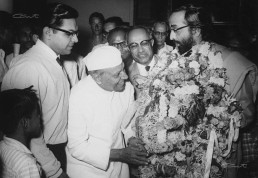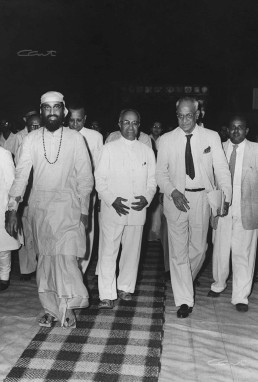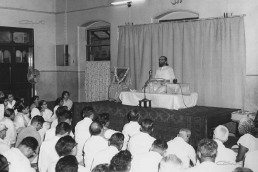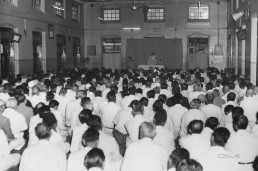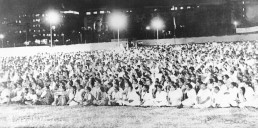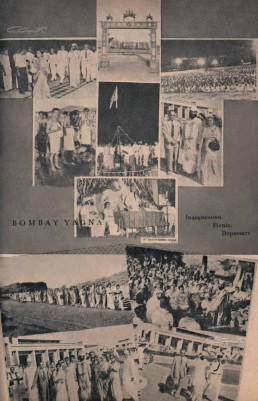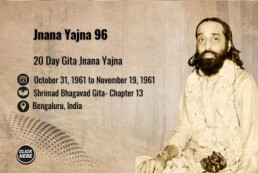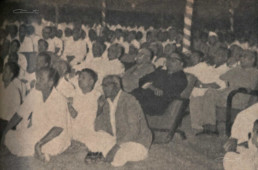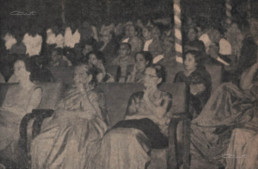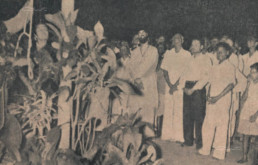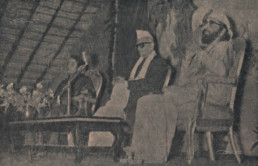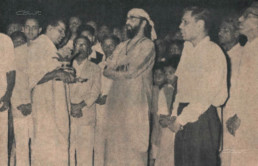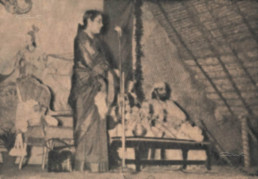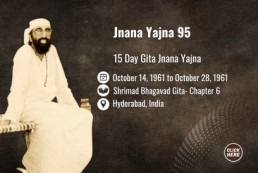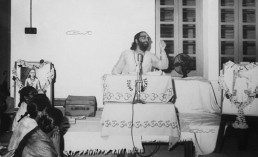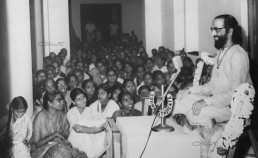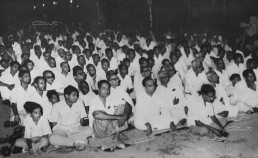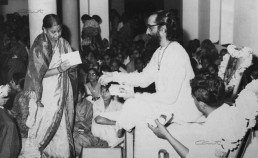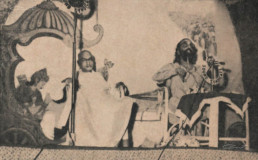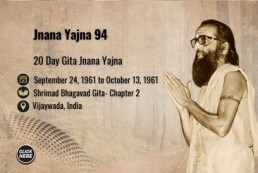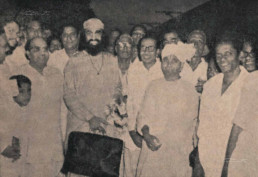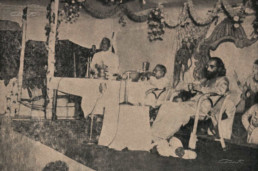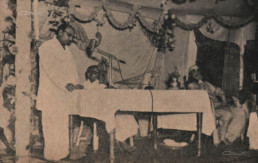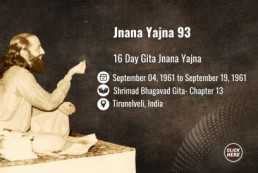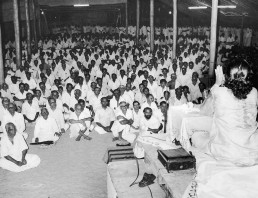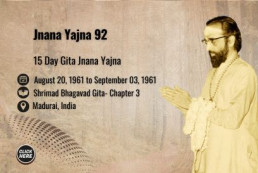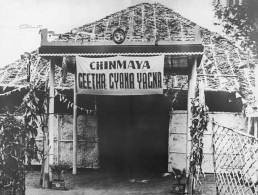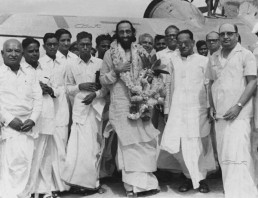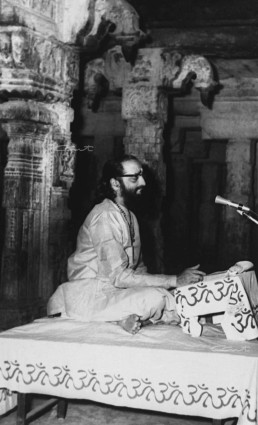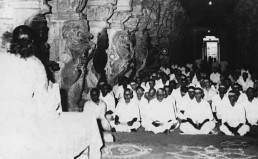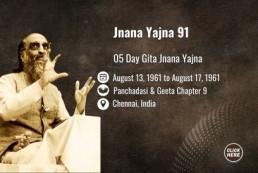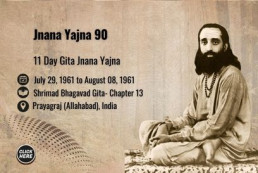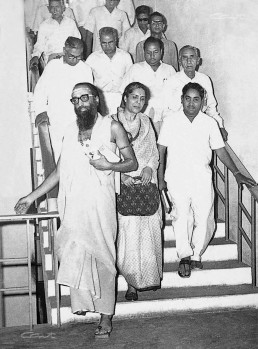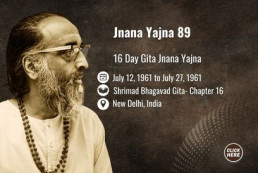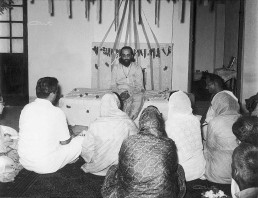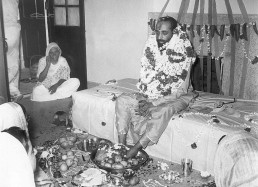Jnana Yajna 98
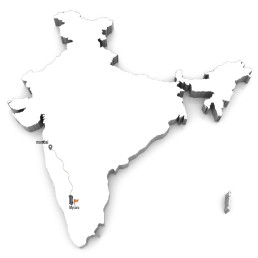
Jnana Yajna 98

Year & Dates:
December 14, 1961 to January 02, 1962

Yajna Topic:
Shrimad Bhagavad Gita- Chapter 2

Place:
Mysuru (Mysore), India
From the cosmopolitan Mumbai to the quieter Mysuru – Pujya Gurudev moved swiftly and gracefully, His pace and focus never broken. His 98th Jnana Yajna in Mysuru would be the 20th yajna of His in the year 1961, and the frequency of His travel, His yajnas, the silently hectic work in shaping Sandeepany Sadhanalaya, and His other commitments were on the rise. However, His poise and balance were spectacular.
On the evening of December 14, 1961, at 6:30 pm, in the ornate and expansive Hall of the Exhibition Buildings, the yajna was inaugurated by His Highness Sri Marthanda Varma, Eliyaraja of Travancore after Sri S. Channiah, the president of the yajna committee M.L.C., welcomed all.
In a crisp address, His Highness pinpointed the need for Bhakti and Ekaagrataa for spiritual evolution.
Knowledge and Compassion for All
Beginning His yajna with a clear differentiation between the externally-focused secular sciences and the introspective spiritual science, Pujya Gurudev talked about the longstanding analyses of the sages of India. Their wise and pure perceptions were compiled in the three founding scriptures – the Prasthaana Trayi, namely the Upanishads, the Brahma Sutras and the Bhagavad Gita. While the first two built the philosophy, the Gita showcased the practical application. Particularly when one has questions about duties in life like Arjuna did, the Gita holds wholesome answers, always relevant and timely. With that preface, Pujya Gurudev launched into His eloquent exposition of the overarching contents of Gita’s second chapter during His evening discourses. The mornings were devoted to the descriptive Atma Bodha of Adi Shankaracharya which, being a lucid guide for all the scriptural terms used, perfectly complemented the Gita, the essence of all upanishads.
In addition to the discourses, one former yajna feature was incorporated in the Mysuru yajna which was the Vishnu Sahasranama Laksharchana performed in the presence of Pujya Gurudev. The ardent worship from 7 am to 3:45 pm sanctified everyone who participated.
The members and devotees of Mysuru wanted to offer their seva to their adored Guru. Thus, the secretary of the Mission’s local branch published Kannada translations of the Gita verses, and Pujya Gurudev blessed that release on December 17, 1961. Further, Smt. Bhagyalakshmamma Ramappa, the president of the Balamahotsava Committee printed and donated the proceeds from 1000 copies of Sri Shankara Guru Stuti to Sandeepany Sadhanalaya.
An absolute delightful highlight of this yajna was the All Karnataka Chinmaya Bala Mahotsav conducted during December 26 – 28,1961. 300 children, from ages 6 to 16, bubbling with energy convened at the Dasara Exhibition grounds to rejoice in a 3-day “Chinmaya Way” camp replete with a parade, suryanamaskar sessions, chanting, story-telling, bhajans, dance, and dramas. Pujya Gurudev was enchanted by the little maestros in each category, and His mention of about 500 Bala Vihars functioning across India during the prize-giving ceremony was a joyful indication that the Chinmaya cultural revival had strong, young wings.
A Meditation Minute:
समस्तजनकल्याणे निरतं करुणामयम् । नमामि चिन्मयं देवं सद्गुरुं ब्रह्मविद्वरम् ॥१॥
samastajanakalyāṇe nirataṃ karuṇāmayam । namāmi cinmayaṃ devaṃ sadguruṃ brahmavidvaram ॥1॥
- Salutations to Sadguru Chinmaya the best among knowers of Brahman, who is all compassionate and remains ever engaged in the welfare of all people.
To Pujya Gurudev, we bow down with immense gratitude for His compassion that brought Him from the pristine Himalayas to spiritually enrich our homes and hearts. Every one of His tireless efforts have become an inspiring, perennial gift to generations.
Photo Gallery
Mysore committee members are sure to grab the opportunity for a photoshoot with Gurudev! Who wouldn't!
"Left to right: Dr. Mari Swami (Treasurer), Shri Chennaiah (President), Swamiji, Ealya Raja, Ramappa (Mission President), Satyanarayan Rao (Mission Secretary). Second Row: Left to right- Kampaigouda N. Rachaiyya (Minister) during 98thYajna"
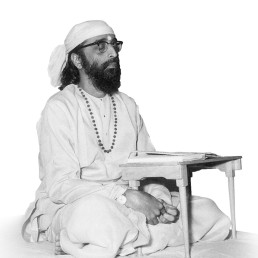
“Think,” Says Pujya Gurudev
“Therefore, apple yourself,” advises Krishna, “to the devotion of action, Yoga.” In this context, again Vyasa is giving a definition of Yoga as he means it here. Earlier he had already explained that “Evenness of mind is Yoga.” Now he re-writes the same definition more comprehensively and says “Yoga is dexterity in action.”
In a science, if in every chapter, the very same term is defined differently, it would bring about confusion in its understanding. Then how is it that in the Science of Religion we find different definitions of the same term? This riddle gets itself solved as soon as we carefully try to understand the definition intimately. The earlier definition is being incorporated in the latter one for, the true dexterity of Yoga may be misunderstood as a mere ‘evenness of mind’ producing inaction and slothfulness. Here in this definition that misunderstanding is pointedly removed and this the Karma Yoga, as indicated in the all-comprehensive meaning implied herein, indicates the art of working with perfect mental equilibrium in all the different conditions indicated by the term “pairs of opposites” (Dvandvas).
From Tyagi Magazine
Don’t Give Up!
Emotions, when controlled, are a source of beauty and strength, but when they overpower you, they lead to tragedy and weakness. Being overwhelmed by emotions can result in a breakdown at the mental, emotional, and physical levels, leaving one unable to think rationally or find solutions to their problems. It’s essential to confront challenges with courage, resilience, and determination, rather than succumbing to feelings of impotence
Jnana Yajna 97
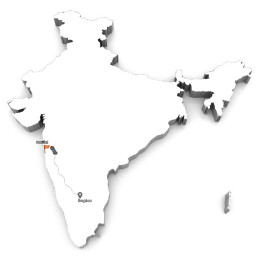
Jnana Yajna 97

Year & Dates:
November 22, 1961 to December 12, 1961

Yajna Topic:
Shrimad Bhagavad Gita- Chapter 15

Place:
Mumbai (Bombay), India
“The secret vein of energy that runs in every one of us is struck, not through pills and elixirs, but through dedicated actions. Selfish actions drain our energy. Actions dedicated unto the feet of the Lord, or unto any higher cause, generate energy and ginger up enthusiasm in man.” Thus ran the concluding quote from Pujya Gurudev on the 140-page souvenir, Hail Renaissance Vol.III released on the occasion of His memorable 97th Jnana Yajna in Mumbai. And, enthusiastic dedication underscored every aspect of that 21-day yajna held from November 22 to December 12, 1961.
Behind the Marine Drive, in the 9000 sq.yard enclosure of the Lloyds Recreation grounds stood the yajnashala with an attractive shamiana. The riveting background of the dais had the painting of Bhagavan Krishna reining the five horses of the mighty chariot in which Arjuna sat facing His dear friend and Divine Charioteer.
A Reviving Blaze of Truth Supreme
The 97th Jnana Yajna was a spiritual bonanza of mammoth proportions. The yajnashala seated over 12,000 earnest seekers, and the first three days were devoted to a clear introduction to the great Gita. With the provided pocket editions of Chapter 15 with the verses in both Sanskrit and English, the devotees recited in unison after Pujya Gurudev chanted the verses before His every discourse. The aura of around 12000 diverse people being everyday in the yajnashala from 6:30 pm to 8 pm, in perfect, concentrated silence entranced by the Highest Knowledge flowing from Pujya Gurudev was powerful beyond words. Knowledge shone with the worshipful touch of Bhakti when Pujya Gurudev also infused devotion through Gita’s chapter 12.
His morning discourses on the soul-stirring Kathopanishad at Lady Northcote Hindu Orphanage Hall, Chowpatty, drew over 700 faithful aspirants and made them soar to subtle heights. Verily, Mumbai, the home of Mahalakshmi, was permeated by the brilliance of Ma Saraswati in that yajna.
A brief and unforgettable yatra on the sea was arranged, a yajna feature from the past. The steamship Champaka sailed with about 900 pilgrims on December 9th to the natural, peaceful Harnai Harbour, 78 miles away from Mumbai. Pujya Gurudev advised that all pilgrims address each other only as “Narayana” – the divine essence in all. He explained how the voyage of Life across the ocean of Samsaar required mental purification, surrender to Bhagavan, and renunciation of the lower divisive outlook.
After a blissful meditation in the predawn silence of 4:30 am and the avabhruta snanam to wash away all vasanas in the gentle waters of the harbor, the devotees gathered around Pujya Gurudev. In a sublime Satsang, He outlined the four steps of spiritual evolution: Tat Buddhi – Gain Knowledge from the Guru; Tad Aatman – Live by that Knowledge; Tan Nishta – Meditate on That; Tat Paraayanam – Fix that as the foremost Goal.
When the 97th Jnana Yajna ended on December 12th, Pujya Gurudev wrote in appreciation to the yajna committee president, Sri B. N. Kamdar and his team: “The Beauty of Beauty is indeed a heart shot with missionary zeal working in a full spirit of devotion and selflessness…I am grateful to my Lord that He gave me this darshan in my yajnashala. The crowd was He; the love they showed me was He; the workers were He…”
A Meditation Minute:
नानापुराणनिगमागमतत्त्वविज्ञ साक्षात्कृतप्रणवसारमुदारभावम् ।
संसारघोरतरकाननदाववहिं श्रीचिन्मयं गुरुवरं हृदि भावयामि ॥ ८ ॥
nānāpurāṇanigamāgamatattvavijña sākṣātkṛtapraṇavasāramudārabhāvam ।
saṃsāraghoratarakānanadāvavahiṃ śrīcinmayaṃ guruvaraṃ hṛdi bhāvayāmi ॥ 8 ॥
“I meditate in my heart upon Śrī Chinmaya, the best of teachers, the knower of Truth propounded by all the scriptures, who has realized the essence of Praṇava (Om), and is of a generous disposition, who is like a wildfire in the thick forest of samsāra.”
- Chinmaya Ashtakam verse 8
Pujya Gurudev was a most extraordinary, realized Teacher. He induced a love for learning the scriptures even in the most unusual of seekers. Ferrying us across samsara like a skilful boatman, He made the journey joyful with His anecdotes, jokes, and boisterous laughter. Simultaneously, fierce as a wildfire, He burned our negativities. To that Resplendent, Pujya Gurudev, “Sri Chinmaya,” our heartfelt prostrations.
Photo Gallery

“Think,” Says Pujya Gurudev
“A Ray of Myself”:- The Infinite has no parts: can suffer no divisions within Itself. And yet, just as with reference to the four walls of my room I consider the ‘roomspace’ as different from the “outer-space”, so too, with reference to a given mind-intellect vehicle, the Infinite Light of Consciousness playing upon it is considered by the ignorant as limited by the very vehicle. The Moon-in-the-bucket will dance trembles at the touch of a passing breeze. Even if a million such reflected Moons have broken and shattered, the immortal Moon in the heavens will not suffer any self-destruction. Similarly, the ego-centric personality (Jeeva) born out of the Consciousness playing upon a given subtle-body suffers no limitation. Even though the ego changes with its joys and sorrows, with its knowledge and ignorance, with its peace and agitations, the essential nature of the Consciousness Infinite that sparkles in our hearts is Eternal indeed, and hence the stanza qualifies the Self in man as: ‘the Eternal Jeeva in the world of Jeevas.’
From Tyagi Magazine
The Three Spiritual Paths!
The transformation of an individual’s personality is achieved by changing the quality, quantity, and direction of thoughts through devotion, Karma Yoga, and the path of knowledge. These methods are interconnected, with each influencing the others, leading to a holistic evolution of the individual’s mental structure towards higher ideals and spiritual growth. Combining all three approaches accelerates the journey towards self-improvement and realization.
Jnana Yajna 96
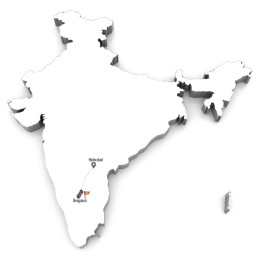
Jnana Yajna 96

Year & Dates:
October 31, 1961 to November 19, 1961

Yajna Topic:
Shrimad Bhagavad Gita- Chapter 13

Place:
Bengaluru, India
The 96th yajna of Pujya Gurudev’s, which was the sweet 7th opportunity for Bengaluru, was slated to be inaugurated only at 6:30 pm on the evening of October 31st. However, the aspiring audience began walking into the yajnashala even by 4 pm, demonstrating how both time and space became sacred commodities when Pujya Gurudev arrives in town. What He did in terms of redefining the sense of punctuality and inculcating an orderly outlook and format in performing a Jnana Yajna are a part of the valuable legacy of Chinmaya Mission.
In that 96th Yajna, the Om flag was hoisted by Smt. Malati Ramakrishna Rao, the president of the ladies’ yajna committee which had organized the 96th yajna. After welcoming Pujya Gurudev, she invited Sri. Kulapati Kanaiyalal Maneklal (K. M.) Munshi, a reputed lawyer and versatile scholar who founded the Bharatiya Vidya Bhavan in 1938, to inaugurate the yajna.
Experience of Peace Three-Fold
In her welcome address, Smt. Rao had drawn attention to the unceasing travel and incredible efforts that Pujya Gurudev put in weeding out the misinformation about Hinduism while fostering the logical approach to ancient Vedic philosophy. She added, “He has convinced us that we need not be sadhus or recluses to lead a spiritual life – that the path of divine life can be achieved and practiced in the midst of worldly affairs – that the impediments to such a life lie not outside us but within us.”
In his inaugural speech, Sri. Munshi shared about his tender and long association of 68 years with the “little book” of the Gita which had never failed to strengthen and inspire him. He called attention to how Indian culture survived for over 5000 years against many odds, and he emphasized that “vitality of India arises from the strength and spirit of our culture…culture is not a distinct way of life, but it is the spirit of man.” He outlined how the Gita helps to overcome the grip of ego, the ‘I-ness and My-ness,’when daily living itself turns into a jnana yajna. Through mindful balance, inspired work, and surrender to Bhagavan, success happens, he assured.
Pujya Gurudev reiterated the importance of Sadhana which is termed yoga in the Gita. He pointed out how 13th chapter gives a comprehensive and exhuastive insight to understand both the Field and the Knower so that a student of Gita can enter Gita, experience, conquer and live It subjectively.
The diverse public of Bengaluru also attended Pujya Gurudev’s Kaivalyopanishad discourses in the mornings. The response to the yajna organized in an exemplary manner by the all-ladies yajna committee was overwhelming. Even Pujya Gurudev expressed how He had felt a special sense of satisfaction in teaching, there, the Kshetra Kshetrajna Vibhaga Yoga, a chapter He had taught so many times before.
A Meditation Minute:
कल्याणशीतलकटाक्षनिरीक्षणेन तापत्रयप्रशमनैकपरं सुधीरम् ।
प्रज्ञानवारिधितरंगविहारलोलं श्रीचिन्मयं गुरुवरं हृदि भावयामि ॥ ७ ॥
kalyāṇaśītalakaṭākṣanirīkṣaṇena tāpatrayapraśamanaikaparaṃ sudhīram ।
prajñānavāridhitaraṃgavihāralolaṃ śrīcinmayaṃ guruvaraṃ hṛdi bhāvayāmi ॥ 7 ॥
“I meditate in my heart upon Śrī Chinmaya, the best of teachers of firm wisdom, who subdues the three human miseries (ādhibhautika, ādhidaivika, and ādhyātmika) by a mere soothing and auspicious glance, and who sports joyously upon the ocean of supreme wisdom.”
- Chinmaya Ashtakam verse 7
Pujya Gurudev’s conviction and faith in the scriptures was so firm that it visibly diffused through the thousands who walked into His yajnashalas. All afflictions – as He termed so concisely as “Seen, Unseen, and Within” would simply resolve in His Presence. His mere glance, even from His image or pratima after He attained Mahasamadhi, holds the power to quieten the agitations in the minds of millions.
To that curative and compassionate anchor, “Sri Chinmaya,” our heartfelt prostrations.
Photo Gallery

“Think,” Says Pujya Gurudev
When one has understood that the atoms are the physical units of matter one must also realize at once that these atoms in different combinations of numbers and patterns create the world of Infinite forms and qualities. Similarly, here to know that the Self is the ultimate Truth behind the names and forms is in itself only a partial knowledge. The complete understanding of Life can arise only when we at once understand how from the Self the endless multiplicity of names and forms rise up and spread to become the Universe.
Just as in our understanding we can comprehend all the waves as inherent in the ocean, so too a man of right understanding can recognize “the separate existence of all beings in the one”. Once having understood the ocean we would have also thereby realized how the numberless waves rise from that one ocean; so too a man of light understanding also realizes “the expansion of the plurality from that one alone”. Such moments of complete understanding wherein the Man of Wisdom experiences the one Self within and without-enveloping and enracing, penetrating and nourishing not only the depthless depths of the measureless Infinite, but also the superficial world of pluralistic names and forms-are the sacred moments when he has “become the Brahman”.
From Tyagi Magazine
Why it is difficult to realise God?
The Upanishadic statement elucidates the omnipresence and omniscience of the divine, perceiving and encompassing all existence, animate and inanimate. Despite the subtlety of this presence, it pervades every aspect of creation, manifesting as the indwelling essence within all beings and forms, while also transcending spatial limitations, being both farther than the farthest and nearer than the nearest.
Jnana Yajna 95
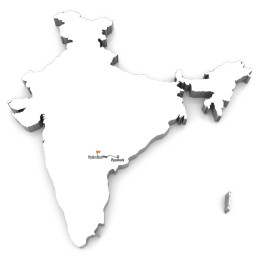
Jnana Yajna 95

Year & Dates:
October 14, 1961 to October 28, 1961

Yajna Topic:
Shrimad Bhagavad Gita- Chapter 6

Place:
Hyderabad, India
Hyderabad’s Shantinagar became the hub to discover what everlasting peace truly meant when it was chosen as the venue for Pujya Gurudev’s 95th Jnana Yajna. The vast quadrangle enclosed on all sides by new houses gained prominence because of the yajnashala it held from October 14 to October 28, 1961.
On the inaugural evening of October 14th, after the Om flag sanctified the space, Justice Munikannaya, the president of the Shantinagar committee, appreciated Pujya Gurudev for leading the post-independence generation to a higher goal.
The focus of the Jnana yajna was Gita’s chapter 6, Dhyana Yoga. Pujya Gurudev captivated the huge gathering from the very moment He soulfully chanted “Om” thrice. The thousands-strong gathering chanted with Him in perfect unison, and the yajna was underway, unmindful of external disturbances. The preparations to step into a world of meditation commenced.
Through Penance and Meditation
The yajna phenomenon predictably played out. The crowds grew by the thousands every evening in spite of bad weather conditions, always surprising the organizers. The seekers listened carefully to Pujya Gurudev’s tips from the sixth chapter to becoming meditation-worthy. In the journey from a sadhaka, a seeker, to the Perfected Sthitaprajna, He outlined the path of right action to be sufficiently purified.
In His morning classes held at the Andhra Yuvathi Mandali from October 17th, the text studied was Panchadashi. The Nataaka Deepa Prakarana chapter challenged the seekers and enthused them to absorb deeply the words of Pujya Gurudev. The hall began overflowing in the morning sessions too as the avid seekers enjoyed the devotional rendering of the Shankara Guru Stotra and Shankara Stuti composed by Adi Shankaracharya’s great disciple, Totakacharya.
Pujya Gurudev carried the message of spiritual empowerment to the army barracks staff at Trimulgherry (now Tirumalagiri) Mandir on October 22nd, speaking about “Religion In Daily Life.” The army families gratefully offered Bhiksha and reveled in a joyfully enriching satsang with Pujya Gurudev. The hope and learning throughout the yajna was voiced in a report that said: “Integration of India is not far when Chinmaya is amidst us. He is integrating the individual through whom the family will be united, the society will be improved, the states will enjoy a harmonious existence, and slowly, the nation will rise up fully integrated.”
A Meditation Minute:
सान्दीपनीति भुवनप्रथितं प्रशान्तं अध्यासितं परममंगलमालयाग्रयम् ।
श्रीमत्तपोवनतपोधनशिष्यवर्य श्रीचिन्मयं गुरुवरं हृदि भावयामि ॥ ६ ॥
sāndīpanīti bhuvanaprathitaṃ praśāntaṃ adhyāsitaṃ paramamaṃgalamālayāgrayam ।
śrīmattapovanatapodhanaśiṣyavarya śrīcinmayaṃ guruvaraṃ hṛdi bhāvayāmi ॥ 6 ॥
“I meditate in my heart upon Śrī Chinmaya, the best of teachers, who is the foremost disciple of Śrī Tapovanam of great penance, who has established the serene and auspicious pioneer abode of learning, renowned in the world as Sandeepany.”
- Chinmaya Ashtakam verse 6
Pujya Gurudev called His entire life’s work as a “Tapovana Vratam.” Acclaimed by the world as a peerless Guru, He viewed Himself as a disciple first. The source of the glorious Jnana Ganga that flowed from Pujya Gurudev came from His surrender at Swami Tapovanam’s Lotus Feet. The Vedantic vision that His Guru instilled in Him inspired the making of Sandeepany Sadhanalaya.
To that Visionary Disciple and Jagadguru, “Sri Chinmaya,” our heartfelt prostrations.
Photo Gallery

“Think,” Says Pujya Gurudev
For example, desire for wealth is healthy inasmuch as it encourages the mind to act and to accomplish, to acquire and to keep, to earn and to save. But when this desire possesses an individual in such a way that he becomes almost hysterical with his own over-anxiety at his very desire, it makes him incompetent to put forth any substantial creative effort, and thus accomplish glories worthwhile for the dignity of man.
A Desire in itself cannot and does not bring about storms in the mind, as can our longing after those very same desires. The Geeta advises us only to renounce our yearnings for all objects of desires.
Through discrimination and proper intellectual evaluation of the sense-objects, when an individual has withdrawn his mind from its usual sense-gutters, the mind comes to take hold of the subtler and the diviner theme of the Self for its contemplation. The limited and finite sense-objects agitate the mind, while the Unlimited and the Infinite Self brings peace and joy into the within. This condition of sense-withdrawal and the entry into the Self of the mind is called its condition of steadfastness (Yukta).
From Tyagi Magazine
Bhagavad Gita is against this!
Pujya Gurudev Swami Chinmayananda challenges the misconception that spirituality involves escaping from worldly responsibilities, emphasizing instead the importance of fulfilling one’s duties with dedication and surrender to a higher purpose. He advocates that for living vibrantly in society, performing obligations with faith and understanding is essential, rather than renouncing them entirely. Ultimately, He defines true renunciation as redirecting one’s ego towards surrender to a higher power while actively engaging in worldly responsibilities.
Jnana Yajna 94
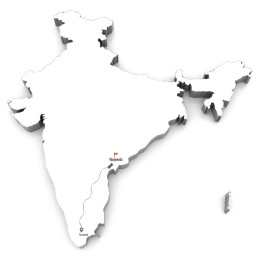
Jnana Yajna 94

Year & Dates:
September 24, 1961 to October 13, 1961

Yajna Topic:
Shrimad Bhagavad Gita- Chapter 2

Place:
Vijaywada, India
Vijayawada felt victorious when Pujya Gurudev accepted its invitation to conduct the 94th Jnana Yajna there. The Vedantic Master had agreed to teach Sankhya Yoga, the transcendental second chapter of the Gita, from September 24 to October 13, 1961. With the precious memories and lessons of the 75th Jnana Yajna (which was Vijayawada’s first) still lingering in the minds of the seekers, sadhakas, and sevaks, preparations began zestfully for the second time.
Every Jnana Yajna of Pujya Gurudev was conceived with care, nourished with mindful efforts, and delivered in a spirit of surrender. True to that trend, from the minute the Raja Saheb of Muktyala announced the happy news of the Master’s Presence for a rare window of three weeks, a reception committee, a yajna committee, and a finance committee were formed to direct all operations for a flawless offering.
Fragrant Essence and Supreme Purifier
Aside from the invaluable insights that Pujya Gurudev gave when He distilled the Highest essence of philosophy and knowledge from the unparalleled chapter 2 of Bhagavan’s Krishna’s Gita, His sagacious guidance during the Second All India Chinmaya Mission Conference held toward the end of the yajna indicate His uncompromising Vision. About 126 delegates assembled in the new hall of the Rice Mill Owners Association on October 9, 1961. While the first conference held at the end of August 1958 in Chennai was themed “Dynamic, integrated Hinduism,” the second conference held from October 9-11 at Vijayawada was inaugurated by Pujya Gurudev with His call to “Concentrate on Individual Development.” Some excerpts from His inaugural address to soak in are:
- For want of an appropriate word, we have taken this term ‘Mission’ to indicate our organization. But, we do not convert others; we convert ourselves.
- Lay the foundation strong. Serve yourself by serving others. If the ground is not ready, if the beauty of life has not come up, remember, the structure cannot be raised. Even if constructed, it will not stand there.
- Unless the members of the Mission are spiritually inclined, I have nothing to do with the Mission. The idea must be spiritual awakening.
- Don’t depend upon opinions. Even if Lord Krishna were to come, a Shishupaala would be there to protest and criticize. Let opinions become a sort of incentive for you to check yourselves up.
- Service must be our prayer, upaasana, our japa, and our archana to the Lord.
- Whenever you are invited to a place or a temple, do not boast. Let not the ego come up in any form – We are only seekers. We are not Siddhas. While trying to develop ourselves, we are trying to share what we have.
- Our Blueprint: Every Group leader must become a Chinmaya. Your own sincerity and tapascharya counts.The path of Truth is laid with truth. These ideas, if you do not bring them into your life, who else can bring them?
- We are trying to make artistic perfection. It is not large-scale production. Hand-made perfection is our attempt.
The Vision He spelled out then inspired, one by one, to build the worldwide Chinmaya Mission we celebrate now.
A Meditation Minute:
विज्ञानसारवचनामृतजह्नुकन्या-निश्शेषधौतभवकिल्बिषमुन्नतांसम्।
श्रीखण्डमण्डितमनोज्ञविशालभालं श्रीचिन्मयं गुरुवरं हृदि भावयामि ॥५॥
vijñānasāravacanāmṛtajahnukanyā-niśśeṣadhautabhavakilbiṣamunnatāṃsam।
śrīkhaṇḍamaṇḍitamanojñaviśālabhālaṃ śrīcinmayaṃ guruvaraṃ hṛdi bhāvayāmi ॥5॥
“I meditate in my heart upon Śrī Chinmaya, the best of teachers, whose large forehead is decorated pleasingly with sandalwood paste, and whose nectarine words expounding the essence of Supreme Wisdom are the Gaṅgā waters that wash all the sins of the world.”
- Chinmaya Ashtakam verse 5
With His broad forehead anointed by the fragrance of timeless scriptures, Pujya Gurudev sprinkled the purifying waters of the Highest Knowledge in our lives. His words, sweet and strong, held the power to avert our downfalls and uplift us to greater possibilities. To that sanctifying Preceptor, “Sri Chinmaya,” our heartfelt prostrations.
Photo Gallery

“Think,” Says Pujya Gurudev
In all such activities, when the worker has gained almost a self-forgetfulness, he will not care for the success or failure of his activity because to worry for the results is to worry for the future moment, and to live in the future is not to live in the present. Inspiration is the joyous content of thrilled ecstasy of each immediate moment. It is said that the contents of a moment in itself is the entire Infinite Bliss.
Established thus in equanimity, renouncing all ego-centric-attachments, forgetting to worry over the results of success or failure, in our activities, act on, says Krishna to Arjuna, and he adds that the great Yoga is to work thus with equipoise in all situations.
From Tyagi Magazine
The Pain of Attachment!
This video highlights the interconnectedness of attachment, fear, and anger, highlighting how attachment breeds fear for the security of loved ones. It illustrates how the removal of fear can quickly transform into anger, stemming from the disappointment of unmet expectations. And emphasizes that true contemplative individuals transcend these emotions by relinquishing attachment for worldly objects, achieving a state of inner peace and detachment.
Jnana Yajna 93
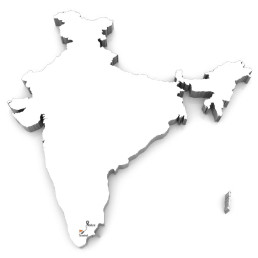
Jnana Yajna 93

Year & Dates:
September 04, 1961 to September 19, 1961

Yajna Topic:
Shrimad Bhagavad Gita- Chapter 13

Place:
Tirunelveli, India
In Pujya Gurudev’s 69th Jnana Yajna which was Tirunelveli’s second blissful exposure to the Vedantic Ganga, the focus of learning had been the stimulating third chapter of Shrimad Bhagavad Gita, Karma Yoga. So, when Pujya Gurudev announced that His 93rd Jnana Yajna will unfold the glory of Gita’s Chapter 13 – the crucial differentiating wisdom of the “Field and its Knower” in Tirunelveli, the seekers of that town were thrilled and grateful. Pujya Gurudev had guided them about the secret of action the previous year, and from September 4th to 19th, He was going to reveal the knowledge of who really was the Knower, what constituted the Field of experiences, the nature of the ‘relationship,’ and why it was important to understand their categorization. Eager to understand the full picture, the exuberant audience of Tirunelveli assembled in the yajnashala.
A Smiling Orange Flame
The inauguration of Pujya Gurudev’s 93rd Jnana Yajna on September 4,1961, opened with the presidential address by the District Judge Shri. Rengarajan who stressed that materialistic minds needed religious rejuvenation. Shri Bhaskara Thondaman, a retired I.A.S Officer, inaugurated the yajna expressing faith in Pujya Gurudev’s endeavor to spiritualize the modern man.
The morning discourses on Ishavasyopanishad and the evening talks on Kshetra Kshetrajna Vibhaga Yoga of the Gita radiated spirituality around town. With His quick wit, charming dramatization, and a rich variety of examples, Pujya Gurudev drove home the importance of viewing the world as the all-pervasive Divine as well as understanding that though Omnipresent, the Self or Supreme Reality is untainted and immutable.
Sri M S. Jayaraman, a lecturer of Hindu College, Tirunelveli, and Sri T. Seshadri, a lecturer of the Madurai College, translated and conveyed in Tamil, Pujya Gurudev’s discourses everyday. When the jnana yajna concluded, the people of Tirunelveli, received the yajna prasad booklet, “Vedanta, A Bird’s eye view” from Pujya Gurudev. To show their support for the upcoming Sandeepany Sadhanalaya, the yajna committee offered a contribution of Re.1001, a small but sincere pledge in reverence for the farsighted work of Pujya Gurudev.
A Meditation Minute:
धावल्यमञ्जुलमृदुस्मितकान्तिपूरं विस्मारिताखिलपदानतदुःखभारम्।
आताम्रशोभनपरिच्छदसंवृतांगं श्रीचिन्मयं गुरुवरं हृदि भावयामि॥४॥
dhāvalyamañjulamṛdusmitakāntipūraṃ vismāritākhilapadānataduḥkhabhāram।
ātāmraśobhanaparicchadasaṃvṛtāṃgaṃ śrīcinmayaṃ guruvaraṃ hṛdi bhāvayāmi॥4॥
“I meditate in my heart upon Śrī Chinmaya, the best of teachers, with His bright, beautiful, and soft smile, who is covered with shining, auspicious saffron clothes, and who removes all sorrows of those who surrender at His Holy Feet.”
- Chinmaya Ashtakam verse 4
Pujya Gurudev’s smile came from His entire joyous Being. Emanating from the glowing orange of His Presence, His smile captured, disarmed, uplifted, and energized millions. He had an inscrutable way of making difficulties disappear when devotees and disciples submitted themselves in sadhana and seva. To that effulgent, cheerful sage “Sri Chinmaya,” our heartfelt prostrations.

“Think,” Says Pujya Gurudev
They who realize and perceive the nature and the essential distinction between the “Field”, the ‘Knower-of-theField” and the “Supreme”, and thus come to experience the non-existence of the “Field” (Prakrti or Avidya or Avyakta) and, therefore, the “ Knower-of-the-Field” (the individuality, the ego, the Samsarin, the limited), theirs is the Knowledge Absolute. The “Field” is the material cause which has no existence apart from mere imaginations and hallucinations. Non-apprehension of the Reality gives rise to misapprehensions of the same. To realize the non-existence of the very material cause is to live the Infinite Nature of the Supreme Self in ourselves, as ourselves.
From Tyagi Magazine
Stop Complaining!
In this insightful video, discover the art of embracing life’s challenges with forbearance and finding peace amidst minor discomforts. Explore practical tips for maintaining a cheerful attitude and rising above trivial irritations.
Jnana Yajna 92
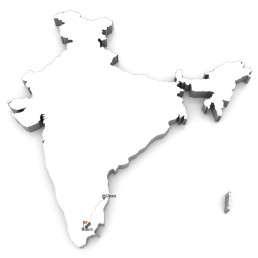
Jnana Yajna 92

Year & Dates:
August 20, 1961 to September 03, 1961

Yajna Topic:
Shrimad Bhagavad Gita- Chapter 3

Place:
Madurai, India
In Madurai, the city ruled by the Grace of Goddess Meenakshi and Lord Sundareshwara, the welcome to Pujya Gurudev was always specially warm. The large pandal near Sri Natesa Iyer Reading Room, Chinna Chokkikulam, part of Madurai, which was the venue of the previous yajna (His 62nd), was already full and filled with the rich music of the Nadaswaram.
Pujya Gurudev arrived at the yajnashala at 6:45 pm accompanied by Sri K. Balasubramania Iyer of Madras (Chennai), who was called “Dharma Rakshamani” because of championing Sanatana Dharma, and Smt, Radha Thiagarajan, the president of the yajna committee.
After the Om flag was hoisted by Sri. A. Ranganathan, a key supporter and the secretary of the previous yajna, the melodious prayer sung by Sri. V. Swaminathan, known for his devotional bhajans, provided the perfect beginning for a sacred Gita Jnana Yajna focusing on Chapter 3 of Bhagavan’s Divine Song.
The Auspicious, All-Embracing Arms
Pujya Gurudev’s discourses were like “shock therapy,” remarked Smt. Thiagarajan as she described the exceptional way Pujya Gurudev effectively removed the “delusion of modern men as even Lord Krishna removed that of Arjuna.”
Inaugurating and introducing Gita’s third chapter, the scholarly Mr. Iyer spotlighted on how Karma Yoga revealed “the philosophy of right action, viz. Nivrtti in Pravrtti.” He elaborated, “Peace and joy are his who is free from the craving for the fruits of actions. Such actions do not bind their owner; for, there is Nivrtti in his Pravrtti.” Pointing out how Pujya Gurudev exemplified this, he said: “The Swami has nothing to gain from this activity: but still he acts. as Lord Krishna Himself did in the Mahabharata war. He finds his joy even as he does his action: not at the end of his actions. This indeed is the Nivrtti in Pravrtti. And this is the essence of the third chapter of the Gita.”
Then came Pujya Gurudev’s catchy beginning: “To a modern man this audience is laughable – In the year 1961, these seemingly educated people sit down and listen to a religious discourse…here so many people sit to hear a discourse by a Swami on something a cowherd boy said to a Kshatriya some 5000 years ago!” That was because, Pujya Gurudev clarified, Gita’s chapter 3 especially taught the supreme way to channel actions for self growth through uplifting, cooperative social good.
The mornings in Madurai were sublime because of Pujya Gurudev’s classes on Mundakopanishad, and the evenings focused on Karma Yoga were unforgettable eye-openers.
A Meditation Minute:
आयामरम्यभुजदण्डगभीररूपं मायान्धकारविनिवारणभद्रदीपम्।
मुद्रादरिद्रकरुणावरुणाधिवासं श्रीचिन्मयं गुरुवरं हृदि भावयामि॥३॥
āyāmaramyabhujadaṇḍagabhīrarūpaṃ māyāndhakāravinivāraṇabhadradīpam।
mudrādaridrakaruṇāvaruṇādhivāsaṃ śrīcinmayaṃ guruvaraṃ hṛdi bhāvayāmi॥3॥
“I meditate in my heart upon Sri Chinmaya, the best of teachers, with beautiful staff-like outstretched arms and a profound form; who is the auspicious lamp that dispels the darkness of Maya and is the abode of the ocean of compassion.”
- Chinmaya Ashtakam verse 3
With a big heart and arms ready to embrace seekers of all faiths and temperaments, Pujya Gurudev transformed lives, illuminating the path to spiritual evolution. From the throes of Maya to the portals of Moksha, He pointed the way. To that benevolent and enlightening “Sri Chinmaya,” our heartfelt prostrations.
Photo Gallery

“Think,” Says Pujya Gurudev
In a dream we create a world of our own and we get ourselves identified with that world so made, and this identifier is called the dreamer. We all know that the sorrows of the dream all belong to the dreamer and to no one else. The dreamer is liberated from his pains when he ends his identification with his dream kingdom. Similarly, the actions in the world outside, which are nothing other than the vasanas existing in one’s own mind, cannot of themselves give one any attachment, but the attachment is felt by that in each one which gets itself identified with each one’s own mental condition. The moment one understands this simple fact, all one’s attachments end, and thereafter, one lives in perfect peace.
This identification with the mental condition creates the false sense of ego which arrogates to itself the idea: “I am the doer”. The doer demands the fruits of his action. To get over this attachment is to end this misconception.
From Tyagi Magazine
What is Lust?
Lust is as intense desire, extending beyond mere carnal cravings to encompass greed for wealth, power, and fame. In this video Swami Chinmayananda likens it to an insatiable glutton, compelling individuals to compromise their rationality and commit sins. And concludes with a word of caution against the destructive nature of lust, which erodes one’s moral integrity and inner peace.
Jnana Yajna 91
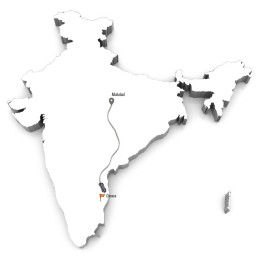
Jnana Yajna 91

Year & Dates:
August 13, 1961 to August 17, 1961

Yajna Topic:
Shrimad Bhagavad Gita- Chapter 9 & Panchadasi

Place:
Chennai, India
By train from Prayagraj to Chennai, after a journey over 36 hours, Pujya Gurudev came to Chennai for an unusual Jnana Yajna, an exclusive set of special talks for the members of Chinmaya Mission. The venue for these talks was M.CT.M. Chidambaram Chettyar School Hall, familiar because of previous yajnas held there. And, the 91st Jnana Yajna was the shortest intensive – a four-day yajna from August 13th to 17th.
The discourses provided a glimpse into the great text, Panchadasi, written by Swami Vidyaranya extolling the non-dual Absolute Reality in 15 thought-provoking chapters. Panchadasi is uniquely the most elaborate among the elementary texts, the Prakarana Granthas, of Vedanta. Its 1571 verses are divided into three parts of five books (aka chapters), which elucidate the three aspects of Truth – Sat, Chit, and Ananda. Pujya Gurudev also inspired the avid member-seekers in Chennai with the uplifting verses of Gita chapter 9 – Rajavidya Rajaguhya Yoga.
Blossoming Insightful Knowledge
In the early part of 1961, Pujya Gurudev had conducted a full scale Jnana Yajna, His 80th in Chennai. In the July 1961 issue of Usha, the effects of that Yajna were reported: “The Chinmaya Floodlight that was projected across the intellectual and spiritual firmament of Madras during this year’s Yajna has been developing into a magnificent spiritual conflagration steadily burning down the fuel of ignorance in the hearts of the Madras seekers. The birth of new branches of the Mission in areas hitherto unexplored or lying dormant in the spiritual field and the earnestness and zest for knowledge evinced in the various study circles of the branches bear ample testimony to this spiritual progress of the Chinmaya pilgrims.”
Apart from the four strong study groups in Chennai, a fifth group blossomed in Mylapore. Two new branches at Nungambakkam and Kodambakkam were also inaugurated. In His letters to guide the growth of these new offshoots, Pujya Gurudev reminded, “better the knowledge of the path, quicker the pilgrim’s progress.” He alerted how study groups must be dedicated and inspired. He emphasized that the group leader must possess an “unflagging zeal to learn, to impart, and to live the spiritual knowledge grasped by the intellect.”
A Meditation Minute:
उन्मीलदम्बुजदलायतमुग्धनेत्रम् उत्तप्तनिर्मलसुवर्णसमानगात्रम्।
उन्निद्रभक्तजनमानसराजहंसं श्रीचिन्मयं गुरुवरं हृदि भावयामि ॥२॥
unmīladambujadalāyatamugdhanetram uttaptanirmalasuvarṇasamānagātram।
unnidrabhaktajanamānasarājahaṃsaṃ śrīcinmayaṃ guruvaraṃ hṛdi bhāvayāmi ॥2॥
“I meditate in my heart upon Śrī Chinmaya, the best of teachers, whose large lovely eyes are like the petals of a blossoming lotus, whose form is shining like pure gold, and is the king of swans (Haṃsa) sporting in the alert minds of the devotees.”
- Chinmaya Ashtakam verse 2
Pujya Gurudev’s penetrating, deeply compassionate gaze of pure Knowledge removed the blindness of the spiritual ignorance of millions worldwide. His brilliant aura was of shining Consciousness. In every Jnana Yajna, He highlighted the Vedantic know-how to clearly separate the significant from the shallow. To that discerning and wise “Sri Chinmaya,” our heartfelt prostrations.

“Think,” Says Pujya Gurudev
Vedanta is no religion in the ordinary concept of the term, which implies the formalistic observance of some physical and mental discipline, in some House of God, during a specific day of the week for a prescribed length of time. If we consider religion as an Art of Right-action, then Vedanta is indeed the noblest of sciences, because it provides the scientific explanation for the entire ways of right-living. Krishna here qualifies it as,”this is the Royal Science, the Royal Mystery, pure and very high.”
The term”Royal Secret” (Raja-guhyam) has been too literally understood and insisted upon by the unimaginative pundits and the effect of their preaching has brought about, to a large extent, the shattering of our culture, at once distressing and sad. The term ‘secret’ here is to be understood as ‘profound’. Newton’s “Laws of Motion”, though they faithfully work out around every living creature and inert things of the world, to a child or to an ignorant villager, it is a secret, inasmuch as, it is too profound for their lay understanding.
From Tyagi Magazine (Geeta Chapter 9)
“Before the creation, there existed the Reality, One only, without a second, and without name and form. That It even now (after creation) exists in a similar condition is indicated by the word ‘That.’
From Swami Vidyaranya’s text: v.5 (Panchadasi)
This alone can give Lasting Happiness!
Desires lead to mental agitation, obstructing the inherent joy of consciousness. True happiness arises when the mind is tranquil, as it reflects the inherent bliss of existence. By transcending desires and calming the mind, one can experience enduring happiness rooted in the realization of one’s true nature beyond the fluctuations of the mind.
Jnana Yajna 90
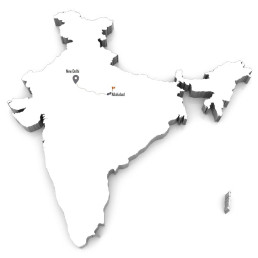
Jnana Yajna 90

Year & Dates:
July 29, 1961 to August 08, 1961

Yajna Topic:
Shrimad Bhagavad Gita- Chapter 13

Place:
Prayagraj (Allahabad), India
Considered one of the holiest cities of pilgrimage for the Hindus, Prayagraj, also known as Allahabad, is renowned for its Triveni Sangam – the confluence of the sacred rivers – Ganga, Yamuna, and the mythical Saraswati. The city sanctified in the Puranas and the epics of Ramayana and Mahabharata is revered also as the place of God Brahma’s first yajna called the Prakrishta Yajna – the yajna of Creation. In such a hallowed place highly associated with spiritual learning and literature, Pujya Gurudev conducted His 90th Jnana Yajna.
The previous yajna of Pujya Gurudev’s at Prayagraj was in October 1958 when He enlightened the seekers on the glory of Bhakti Yoga with His discourses on Gita’s chapter 12. Knowing that the branch of Chinmaya Mission at Prayagraj needed continuity, Pujya Gurudev chose to teach Gita’s 13th chapter along with His morning classes on Ishavasyopanishad.
A Bee of Spirituality
The venue for the short 11-day yajna was aptly chosen; it was the Kali Prasad Inter (K. P. I) College founded by the greatly respected Munshi Kali Prasad Kulbhashkar who gave all of his land and property to educate the less fortunate in the late 1800s.
In His summary of the 13th chapter, Pujya Gurudev called it one of the most brilliant chapters in the Gita which provides “a direct subjective method of meditating upon and realizing the Imperishable and Eternal in ourselves.” He pointed out how the plurality of all experiences of perception, feelings, and thoughts in the “Field” are supported by the One Indivisible and Changeless Knower.
The theme of All-pervasiveness continued in the morning classes on Ishavasyopanishad when Pujya Gurudev eloquently guided the aspirants to contemplate upon the how the All-Pervasive must also be something that cannot move. He explained: “Since Consciousness is all-pervading, it cannot move, and nothing that moves in the Universe can ever move except in the medium of Consciousness.”
Just as in that 90th yajna, in every Jnana Yajna, Pujya Gurudev’s depth of spiritual expression astounded the large group of seekers.
A Meditation Minute: The verses of Chinmaya Ashtakam written in poetic Sanskrit echo the reverence that many thousands began to feel in that spectacular first decade of Pujya Gurudev’s Vedantic Renaissance. In the momentous 108-yajna pilgrimage, Pujya Gurudev illumines the way and embodies the goal; thus, to meditate on Him turns our attention to the Highest.
ओंकारसूनमकरन्दरसं पिबन्तम् अध्यात्मभृङ्गमवनीतलभाग्यशृङ्गम् ।
आनन्दपूर्णमतिमप्रतिमप्रभावं श्रीचिन्मयं गुरुवरं हृदि भावयामि ॥१॥
oṁkārasūna-makarandarasaṁ pibantam adhyātmabhrnga-mavanītala-bhāgyaśṛngam,
ānanda-pūrna-matima-pratima-prabhāvaṁ śrīcinmayaṁ guruvaraṁ
“I meditate in my heart upon Sri Chinmaya, the best of teachers, the bee of spirituality that drinks the nectar in the flower of Omkara, the greatest blessing upon the earth, whose mind is full of bliss, and whose glory is incomparable.”
- Chinmaya Ashtakam verse 1
Pujya Gurudev wanted the ‘educated yet lost’ to taste the unparalleled sweetness of Vedanta that He enjoyed. His great compassion made Him go from place to place proclaiming that secret to true happiness. To that inimitable blessing “Sri Chinmaya,” our heartfelt prostrations.

“Think,” Says Pujya Gurudev
All things in the world that are born both the world of inert matter (unmoving) and the world of Conscious beings (moving) arise neither from the Field (Prakriti) nor from the Knower-of-the-Field (Purusha). The source is from the marriage between Prakriti and Purusha. This combination of Matter and Spirit is not an accomplished nuptial but it is only a mutual super-imposition.
In every super-imposition a delusion is recognised upon a substratum: the ghost on the post. Not only the form, and all attributes of the ghost come to be projected upon the post but also the post lends its existence to the non-existent ghost. As a result of its mutual exchange we find that the non-existent ghost comes to exist in our experience, while the existing post becomes a non-existent ghost with illusions of physical limbs and ghastly behaviors. This process, which is the trick of the human mind, is called mutual superimposition. In the pure Consciousness there is no Field of Matter. The fields of matter have neither existence nor sentiency. But the Spirit plays in the Field and becomes the Knower-of-the-Field (Purusha) and when this purusha works in Prakriti the combination breeds the entire phenomenon universe constituted of the moving and the unmoving.
Through careful discrimination when we successfully discover this play in ourselves the vision of the plurality recedes and we understand that the ultimate Truth is the Substratum on which both Prakriti and Purusha come to play.
From Tyagi Magazine
The Story of Miss Electricity!
In this video Pujya Gurudev Swami Chinmayananda critiques the Western perception of Hindu gods as terrible and explains the omnipresent nature of divinity using the analogy of electricity. They elucidate how consciousness enlivens all aspects of existence, from bodily functions to inanimate objects, emphasizing the omnipresence of divinity in all manifestations. Ultimately, they assert that the essence of divinity transcends physical forms and exists beyond material constructs.
Jnana Yajna 89
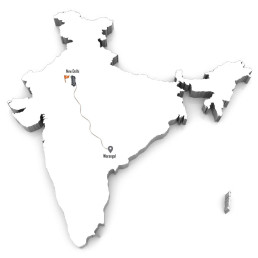
Jnana Yajna 89

Year & Dates:
July 12, 1961 to July 27, 1961

Yajna Topic:
Shrimad Bhagavad Gita- Chapter 16

Place:
New Delhi, India
Yet another early landing on July 11, 1961, at New Delhi’s Palam airport, and Pujya Gurudev, casual and unconcerned about any formal welcome, took a taxi to where His accommodation had been arranged.
Cleaning Leela: He entered 30, Ashoka Road, and cheerfully called out “Om Namo Narayanaya!” completely surprising Mrs. Sheila Puri, His longtime devotee, who was occupied with getting the newly repaired home ready for Him. Seeing how she and the other devotees were busy washing the place, Pujya Gurudev unhesitatingly became part of the “cleaning campaign.” Predictably, the news of this amusing entry and His cleaning “leela” traveled quickly, and many devotees rushed with joy to pay their regards to their beloved Pujya Gurudev.
The 89th Jnana Yajna began on July 12, 1961, at the Community Hall, Panchkuian Road; Pujya Gurudev arrived punctually at 6:30 pm and Sri R. L. Tuli, the president of the yajna committee, welcomed Him with a garland.
Prostrations At His Lotus Feet
With the Om flag silently proclaiming the onset of the Gita Jnana Yajna, the happy and large gathering awaited Pujya Gurudev’s discourses on the 16th chapter of the Gita. In His welcome speech, Sri B. B. Sharma reminisced about the previous yajnas in Karol Bagh and Ashoka Road. Full of reverence for the glorious work of Pujya Gurudev across the country, he conveyed how the people of Delhi felt blessed and had been trying to live up to His guidance.
The morning discourses were on Kaivalyopanishad. The audience, enriched by the teachings of the upanishad as well as the Gita, grew in numbers and understanding. The Community Hall could not hold the crowds as seekers stood in corridors and the outside lawn. One advantage of having the yajna in the indoor setting was that interruptions due to downpours were avoided. Somehow in Delhi, when Pujya Gurudev’s yajnas were conducted, the clouds too celebrated without realizing that they became an obstacle!
Paada Puja: On the morning of July 27, 1961, as early as 6 am, a big group of devotees of Delhi convened at Pujya Gurudev’s place of stay. It was the auspicious day of Guru Poornima. He had given them permission to do His Paadapuja – the worship of His Lotus Feet, and they were elated. Laden with fruits, flowers, garlands, Bhog, and all puja essentials, they waited until Pujya Gurudev emerged from His room at 8 am. Greeting Him with the most reverential silence first, the devotees understood what a great blessing it was to offer worship to His Lotus Feet which symbolized the glory of the Guru Shishya Parampara, particularly Parama Guru Swami Tapovanam through Pujya Gurudev. Then, a beautifully meaningful Paada Puja was conducted while chanting the Vishnu Ashotthara followed by melodious bhajans.
For Reflection: Pujya Gurudev had said, “All through the pāda pūjā, understand the significance that the feet are borrowed from Swami Chinmayananda. You are not worshiping the Swami. If you say or feel so, it is a disaster to me because my vanity will increase. All of us are worshiping Him. I will be turning my mind to my Teacher, and you are turning your mind to your teacher and the Lord.”
Photo Gallery

“Think,” Says Pujya Gurudev
Brilliant Glow: (Teja:) This is not a mere physical complexion produced by overeating and ample rest. It is not just an exterior beauty arising out of careful tending of the physical structure and planned nourishing of the pads of flesh around the sage. The glow of spirituality is not literally a painted glow around his head glimmering as a ring of fire. The brilliancy of his intellect, the twinkling joy of his eyes, the thrilling fragrance of peace around, the serene measure of quiet in his activities, the dalliance of his love for all, the light of joy that ever gurgles out from the innermost depths of his being-these constitute the irresistible attraction of the personality of the sage who with abundant energy serves all and discovers for himself a fulfillment in that service.
Patience; (Kshama): The context in which the word is used here should increase the depth of its meaning. It is not merely a “capacity to patiently live through some of the minor physical or mental inconvenience” but the term ‘patience’ here indicates “unaffectedness”, when insulted or injured by others. In its actual working, It is subtle boldness that comes to a man in facing his world around with an unruffled serenity even in the face of the most powerful oppositions and equally provoking situations.
From Tyagi Magazine
Stop this Vanity!
Swami Chinmayananda reflects on the superficiality of material wealth and outward displays of generosity, emphasizing the importance of genuine involvement and connection in charitable acts. They highlight the emptiness of ego-driven philanthropy and the need for spiritual understanding to transcend limited perceptions of self.
